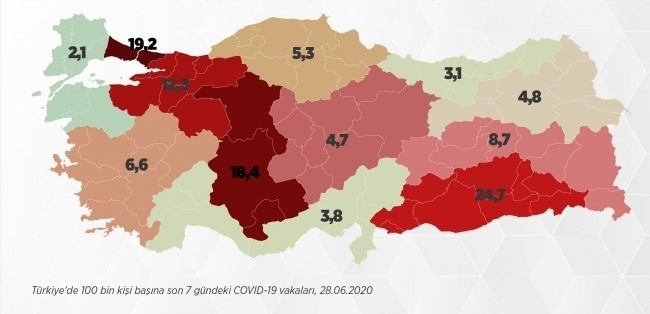The Turkish Association for Child and Adolescent Psychiatry (TACAP)’s Online Interactive Meeting on the Impact of COVID-19 on the Mental Health of Children and Adolescents
By Ozhan Yalcin (Board Member, TACAP) and Fusun Cuhadaroglu (Chair of the International Relations Committee, TACAP)

Correction: An inaccurate image of the Turkish map appeared in a previous version of this article. The bulletin apologizes for this unintended error.
The Covid-19 pandemic struck an unprepared world. Its psychological effects on children, adolescents and on family functioning is an interesting, intriguing and a challenging topic. The impact of the pandemic on children and adolescents who already have mental illness or neurodevelopmental problems and on those who are healthy may vary. Children and adolescents who have parents working on the frontlines fighting Covid-19 or those who have lost their family members due to coronovirus are important groups for mental health practitioners to focus on. Covid-19 is a new illness and knowledge about its effects on people, safety measures, treatment options are constantly evolving.
Various countries are experiencing different phases of the pandemic and therefore information exchange among practitioners from different countries and from different parts of the world is extremely important and can be very beneficial.
As such, the Turkish Association for CAP organized an online meeting with colleagues from Singapore on June 1st, 2020. Singapore has been one of the first countries affected by Covid-19 and also one of the most successful countries in controlling the infection. IACAPAP President Prof. Daniel Fung who is also the Chairman of the Medical Board of the Institute of Mental Health in Singapore was invited as the speaker. He gave a presentation entitled “The Covid-19 Pandemic and Child and Adolescent Mental Health” which included information about Covid-19 in Singapore and experience in mental health settings with children and adolescents with different diagnoses, in addition to efficient strategies in working with them. Dr. Fung emphasized the increasing popularity and necessity of tele-psychiatry, online psychotherapy, and online applications all over the World, though some ethical issues are still being discussed.
Dr Mok Yee Ming, Dr Ong Say How, Dr Tina Fang, Dr Daniel Poremski accompanied Prof. Daniel Fung in the discussion. They shared their valuable opinions and experiences with the participants. In addition to Turkish colleagues, participants from Chile, India, Canada and Singapore all shared their local experiences regarding Covid-19 and mental health issues they were facing in their countries. The discussion revealed that there are shared difficulties especially in mitigating the spread of the infection and that opportunities for safety measures vary depending on management capacity and the economic resources of the country. CAP clinics are mostly locked down except for emergencies but CAP professionals are working mostly online. Clinically, different groups of children are being effected in different ways and it is important to identify children who need to be closely monitored and best ways to provide services for them. Additionally, psychoeducation of the public through telehealth services regarding problems faced by children, adolescents and their families like excessive use of technology, domestic violence, social and economic problems, unemployment among parents, traumatic experiences, anxiety, grief during this period is crucial.
On behalf of the Turkish Association for Child and Adolescent Psychiatry (TACAP) we would like to thank Prof. Daniel Fung and his colleagues Dr Mok Yee Ming, Dr Ong Say How, Dr Tina Fang, Dr Daniel Poremski who created a very friendly atmosphere for this collaborative meeting which was very informative and enriching. We also send our thanks to Singapore IMH’s secretary Choo Ai Ling for her efforts and cooperation in organizing this meeting.

